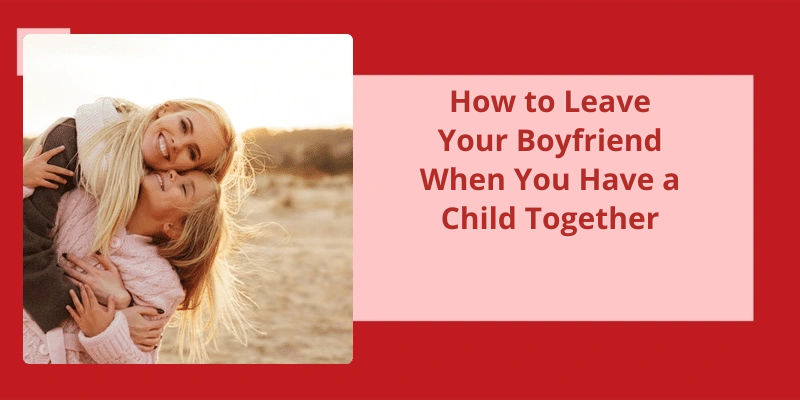Ending a relationship is never an easy decision. And when you’ve a child together with your partner, it can be an even more challenging process. There are many considerations that need to be made, such as how you’ll break the news to your child, how you’ll divide custody, and how you’ll manage your emotions during this difficult time. But with the right approach, it’s possible to end your relationship in a way that’s respectful, compassionate, and fair to everyone involved. In this article, we will explore some useful tips and strategies for leaving your boyfriend when you’ve a child together, including the important steps you need to take to ensure a smooth transition for your entire family. From being open with your kids to finding forgiveness, we will cover all the essential elements of this challenging but necessary process. So if you’re considering leaving your partner but aren’t sure how to navigate this complex situation, read on to learn more.
How Do I Leave My Husband When We Have a Child?
However, it’s important to prepare yourself for the possibility that your spouse may not be so agreeable. In such cases, youll want to consult with an experienced family lawyer who can guide you through the legal process and help you understand your rights and obligations as a parent. A good attorney can also help you gather evidence to support your claims and present a convincing case in court.
Before you actually leave your husband, it’s important to have a plan in place. You should have a clear idea of where youll be living, how youll support yourself and your child, and what your long-term goals are. You may also want to talk to a therapist or counselor who can help you sort through your emotions and gain a better understanding of what youre going through. This can be especially helpful if youre experiencing guilt or second-guessing about your decision.
Once youve left your husband, youll need to be prepared for the emotional challenges that may arise. Depending on your situation, you may find that co-parenting is difficult or that your child is experiencing feelings of confusion or loss. It’s important to be patient and understanding with your child, while also making sure that he or she knows that you love and support them. You may also want to seek out support from friends, family members, or a support group for people who’re going through similar experiences.
Navigating New Relationships as a Divorced Parent
Navigating new relationships as a divorced parent can be challenging as it involves balancing the needs of both the children and the new partner. It’s important to take things slow, communicate openly with everyone involved, and prioritize the well-being of the children above all else.
Moving on from someone you share a child with can be a challenging journey. It takes time, effort, and a lot of emotional strength to let go of a person you once loved deeply. However, it’s crucial to remember that moving on is essential for your mental and emotional well-being, and the welfare of your child. So, here are some tips that might help you navigate through this difficult process.
How Do You Move on From Someone You Have a Child With?
Moving on from someone you’ve a child with can be a difficult and emotional journey. You may still have feelings for the father of your child, or you may feel conflicted about the end of your relationship. Whatever your situation may be, it’s important to take small steps towards letting go and embracing your new life as a single mother.
One crucial step is to avoid dwelling on the past. An important part of moving on is to accept that your relationship has ended and to focus on building a new future for yourself and your child. This means that you should avoid rehashing old arguments or dwelling on memories of your ex-partner. Instead, focus on creating new memories and experiences with your child, and find joy in the present moment.
Another important tip is to avoid appearing desperate for your ex-partners attention or affections. This may mean taking some time to distance yourself from your ex, especially if you find it difficult to interact with them without feeling hurt or emotional. By creating some space and focusing on your own life, you can begin to let go of your feelings and work towards building a new future for yourself.
It may also be helpful to start seeing other people, even if you aren’t ready for a serious relationship. This can help you to regain your confidence and feel more positive about your future. Additionally, it can help you to recognize that there are other great people out there who may be a better match for you.
As a single mother, it’s also important to make peace with yourself and your new role. You must accept that your life has changed and that you’re now responsible for raising your child without the support of a partner. This can be a challenging process, but by embracing your new role and learning to prioritize yourself and your childs needs, you can create a fulfilling life for yourself as a single mother.
Another vital aspect of moving on is to not view your children as an extension of their dad. No matter how difficult your relationship with your ex may be, it’s important to ensure that your child feels loved and supported by both parents. This means that you should avoid speaking poorly of your ex-partner in front of your child and encourage them to maintain a positive relationship with their father.
Finally, it’s crucial to enforce boundaries with your ex. This may mean limiting contact to only essential communication regarding your child, or it may mean setting clear expectations for how you wish to be treated. By setting boundaries, you can protect your emotional well-being and create a healthy environment for yourself and your child.
By focusing on yourself, your child, and creating a positive future, you can let go of your old relationship and embrace the wonderful new opportunities that await you as a single mother.
Source: How to stop loving the father of your child as a single mom
In situations where separating couples have children, it isn’t uncommon for them to continue living together for a period of time. This can be a challenging and emotionally charged experience, but with some careful planning and communication, it’s possible to establish a happy and stable co-parenting arrangement. Here are some tips for separating but living together for the sake of the kids.
How Do You Separate but Live Together for Kids?
Separating but continuing to live together for the sake of children can be challenging, but it’s not impossible. Firstly, avoiding sleeping together is crucial for maintaining emotional boundaries. It will also prevent any confusion for the children about the current state of the relationship. It’s also important to make clear decisions about how to move forward, whether youre separating temporarily or permanently. This can be difficult so you may need to consider seeking professional help to ensure decisions are made with the best interests of the children in mind.
Secondly, avoiding arguing and fighting in front of children is crucial for ensuring a happy and stable environment. It can be tempting to lash out in frustration with the other partner but it’s important to put the needs of the children first and learn to communicate without conflict. A good way of achieving this is through creating a co-parenting schedule where responsibilities are assigned and communicated effectively. This will help to reduce tension and promote cooperation between you and your partner, making it easier to maintain a healthy relationship.
Thirdly, if at any point you feel like you can no longer compromise, it’s important to remember that you’re already separated. This means that you’re free to take actions that are in your best interest, including seeking professional advice and support. Keep in mind that you aren’t alone and that there are many resources available to help you navigate the complex emotions and situations that can arise from separating while living together.
Lastly, focusing on the children is key to making this arrangement work. By prioritizing their needs and well-being, you can create a harmonious and happy environment for everyone. It’s important to remember that children thrive in stable and loving environments, and it’s up to both parents to work together to create this. By making the children the main priority, you can find ways to build and maintain positive relationships and create a healthy family dynamic.
By avoiding sleeping together, making clear decisions, avoiding fighting and arguing in front of them, creating a co-parenting schedule, remembering that you’re already separated, and focusing on the children, you can build a healthy relationship with your partner, and ultimately maintain a loving and supportive family environment. With patience, understanding, and empathy, it’s possible to make this arrangement work well for everyone involved.
However, in the long run, staying in an unhappy relationship may not be the best solution for the well-being of both the parents and the child. It’s a difficult decision that requires careful consideration and weighing of the pros and cons.
Should I Stay in an Unhappy Relationship for My Child?
However, it’s crucial to consider the long-term effects of staying in a unhappy relationship for your child. Children are incredibly perceptive and can sense when there’s tension or unhappiness between their parents. This can lead to emotional distress, anxiety, and even depression in the long run, which can affect their mental health and well-being. Therefore, it’s vital to assess the impact of your relationship on your childs mental and emotional health before deciding to stay together for their sake.
Furthermore, staying in a relationship out of obligation or guilt can lead to resentment and bitterness towards your partner, which can ultimately be taken out on your child. Children are easily affected by negative energy and can pick up on subtle cues of anger and frustration between their parents. This can create an unhappy and tense home environment, which can, in turn, affect their emotional health and well-being. Therefore, it’s essential to make a decision that’s right for you and your child, taking into account your happiness, mental health, and long-term well-being.
Another important point to consider is the impact of separation on your childs life. Divorce or separation can be incredibly disruptive to a childs life, affecting their routines, relationships, and daily activities. It can also lead to financial instability and insecurity, which can cause further stress and anxiety.
However, it’s equally essential to consider the impact of a toxic and unhappy relationship on your childs development. Children thrive in a loving and nurturing environment, where they feel safe and secure. If your relationship is hostile and fraught with conflict, it can lead to emotional distress, anxiety, and even depression in your child.
Ultimately, the decision to stay in a relationship or separate should be based on what’s best for you and your childs long-term well-being. It may be beneficial to seek counseling or therapy to help you make an informed decision, which takes into account all the relevant factors and mitigates any negative impacts on your childs life.
Coping Strategies for Co-Parenting After a Separation: If You Do Decide to Separate From Your Partner, It’s Important to Develop Effective Co-Parenting Strategies That Prioritize Your Child’s Needs. This Could Include Setting Clear Boundaries, Communicating Effectively With Your Ex-Partner, and Maintaining a Positive Co-Parenting Relationship.
After a separation, it’s crucial to have a plan in place for co-parenting. This involves creating boundaries, communicating well with your ex-partner, and building a positive co-parenting relationship that focuses on your child’s best interests.
Navigating a relationship when both partners have children can be challenging, but it’s not impossible. It requires understanding, communication, and a willingness to prioritize time for each other. Here are some tips to help make it work.
How Do You Have a Relationship When You Both Have Kids?
When you find yourself in a relationship with someone who also has children, navigating the challenges can be a truly unique experience. One of the most important things to keep in mind is putting yourself in the other persons shoes. Their children are their world, and any decisions made must take them into account. This can mean being flexible and understanding when plans need to be changed or cancelled for the sake of the kids. Taking the time to listen to their concerns and showing empathy can go a long way towards strengthening the relationship.
When it comes to introducing your children to your new partner, it’s essential to engage in only straight talk. While you don’t need to go into too much detail, it’s important to be honest with your kids about the fact that you’re dating someone new. After all, they’re likely to sense that something is different, and keeping it from them could lead to confusion or resentment. Encouraging them to communicate their feelings with you can also help to alleviate any anxieties they may have.
While fancy dinners and elaborate dates may be great, when youre both dealing with the responsibilities of raising kids, it’s important to learn to love low-key dates. This could mean going for a walk in the park, cooking dinner together, or simply cuddling up on the couch to watch a movie. The most important thing is spending quality together, regardless of the activity.
Relationships can require a lot of time and effort, and when you both have children, that time can be even harder to come by. Setting aside some time for your boyfriend or girlfriend is essential, even if it means getting creative with scheduling. Make sure to prioritize your relationship in order to keep it healthy and strong.
Finally, don’t forget to make time for yourself. When you’ve children, it’s easy to put your own needs and wants on the backburner while you focus on their wellbeing. However, taking care of yourself is just as important. Whether it’s taking a relaxing bath or going for a solo hike, making time for yourself can help you recharge and be the best parent and partner you can be.
Conclusion
Leaving a relationship when a child is involved can be an emotional and complicated process. It requires careful consideration and planning to ensure that everyone involved is treated with respect and care. It’s important to keep an open and honest dialogue with your children, explaining what’s happening in a way that they can understand. Coming to terms with your ex-partner and setting a schedule that works for everyone is vital for the wellbeing of your child. It’s also essential to find forgiveness, both for yourself and for your ex-partner, in the process of moving on. Taking these steps can help minimize the impact of the separation on your child and set the stage for a healthy co-parenting relationship.






